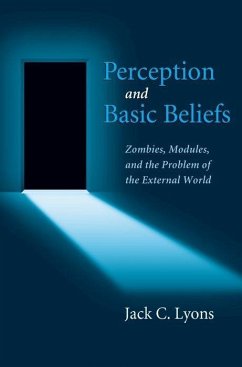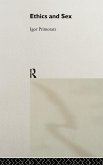- Broschiertes Buch
- Merkliste
- Auf die Merkliste
- Bewerten Bewerten
- Teilen
- Produkt teilen
- Produkterinnerung
- Produkterinnerung
Jack Lyons addresses two central questions in epistemology: which beliefs are epistemologically basic (i.e. noninferentially justified) and where does perception end and inferential cognition begin.
Andere Kunden interessierten sich auch für
![Epistemology Epistemology]() Robert AudiEpistemology202,99 €
Robert AudiEpistemology202,99 €![The Epistemic Innocence of Irrational Beliefs The Epistemic Innocence of Irrational Beliefs]() Lisa BortolottiThe Epistemic Innocence of Irrational Beliefs113,99 €
Lisa BortolottiThe Epistemic Innocence of Irrational Beliefs113,99 €![The Basic Writings of John Stuart Mill The Basic Writings of John Stuart Mill]() John Stuart MillThe Basic Writings of John Stuart Mill28,99 €
John Stuart MillThe Basic Writings of John Stuart Mill28,99 €![Epistemic Responsibility for Undesirable Beliefs Epistemic Responsibility for Undesirable Beliefs]() Deborah K. HeikesEpistemic Responsibility for Undesirable Beliefs81,99 €
Deborah K. HeikesEpistemic Responsibility for Undesirable Beliefs81,99 €![Epistemic Responsibility for Undesirable Beliefs Epistemic Responsibility for Undesirable Beliefs]() Deborah K. HeikesEpistemic Responsibility for Undesirable Beliefs81,99 €
Deborah K. HeikesEpistemic Responsibility for Undesirable Beliefs81,99 €![Ethics and Sex Ethics and Sex]() Igor PrimoratzEthics and Sex202,99 €
Igor PrimoratzEthics and Sex202,99 €![The Basic Writings of John Stuart Mill The Basic Writings of John Stuart Mill]() John Stuart MillThe Basic Writings of John Stuart Mill39,99 €
John Stuart MillThe Basic Writings of John Stuart Mill39,99 €-
-
-
Jack Lyons addresses two central questions in epistemology: which beliefs are epistemologically basic (i.e. noninferentially justified) and where does perception end and inferential cognition begin.
Hinweis: Dieser Artikel kann nur an eine deutsche Lieferadresse ausgeliefert werden.
Hinweis: Dieser Artikel kann nur an eine deutsche Lieferadresse ausgeliefert werden.
Produktdetails
- Produktdetails
- Verlag: Oxford University Press
- Seitenzahl: 218
- Erscheinungstermin: 17. Juni 2011
- Englisch
- Abmessung: 234mm x 156mm x 12mm
- Gewicht: 339g
- ISBN-13: 9780199812073
- ISBN-10: 0199812071
- Artikelnr.: 33372229
- Herstellerkennzeichnung
- Books on Demand GmbH
- In de Tarpen 42
- 22848 Norderstedt
- info@bod.de
- 040 53433511
- Verlag: Oxford University Press
- Seitenzahl: 218
- Erscheinungstermin: 17. Juni 2011
- Englisch
- Abmessung: 234mm x 156mm x 12mm
- Gewicht: 339g
- ISBN-13: 9780199812073
- ISBN-10: 0199812071
- Artikelnr.: 33372229
- Herstellerkennzeichnung
- Books on Demand GmbH
- In de Tarpen 42
- 22848 Norderstedt
- info@bod.de
- 040 53433511
Associate Professor Philosophy, University of Arkansas
Abbreviations
Chapter 1: External Object Foundationalism
1.1The Problem of the External World
1.2 Metaphysical and Epistemological Direct Realisms
1.3 Basic Beliefs
Chapter 2: Doxastic and Nondoxastic Theories
2.1 Evidential and Nonevidential Justifiers
2.2 The Supervenience Argument
2.3 Doxasticism and Nondoxasticism
2.4 Doxastic Theories
Chapter 3: Experientialist Theories: 3.1 Sensation and Perception
3.2 Sensations as Grounds
3.2.1 Sensationless Perception
3.2.2 The Sensation/perception Gap and Collateral Information
3.2.3 Problems Concerning Basing
3.2.4 SE and the Content of Sensations
3.3 Percepts as Grounds
3.3.1 In Search of the Percept
3.3.2 Percepts and Beliefs
3.3.3 The Zombies Return
3.4 The Belief Principle
3.5 Experiential States as Nonevidential Justifiers
3.6 Intuitive Resistance
3.7 Recapitulation
Chapter 4: Perceptual Systems and Perceptual Beliefs
4.1 Perceptual Systems
4.1.1 Cognitive Systems/Modules
4.1.2 Perceptual Modules
4.2 The Plausibility of the Perceptual System Theory
4.2.1 The "Grain Size" of Perceptual Beliefs
4.2.2 Perception and Ungrounded Justified Belief
4.2.3 Perceptual Learning and Nonexperiential 'Looks'
4.2.4 Percept Experientialism Revisited
4.3 Perceptual Beliefs and Basic Beliefs
Chapter 5: Perception, Clairvoyance, and Reliability
5.1 Simple Reliabilism and the Norman/Truetemp Objections
5.2 Clairvoyance and Basicality
5.2.1 Underspecification and the "Clairvoyance Challenge"
5.2.2 Perception and Other Cognitive Abilities
5.2.3 "Meta-Incoherence"
5.3 Reliability and Basicality
5.3.1Clairvoyance and Defeat
5.3.2 Experientialist Reliabilism
5.3.3 Early Reliabilism
5.3.4 Teleological Reliabilism
Chapter 6: Basic Beliefs
6.1 The Delineation Problem
6.1.1 The Desiderata
6.1.2 A Systems Theory of Basicality
6.1.3 Counterexamples and Replies
6.2 Intuitions and Beyond
6.2.1 Descriptive and Normative Epistemology
6.2.2 Cognitive Science and Basicality
6.2.3 Illustration: Why My Philosophy is More God-Friendly than Plantinga's
6.2.4 Reflective Equilibrium and Etiological Constraints
Chapter 7: Basic and Nonbasic Beliefs in a Reliabilist Epistemology
7.1Toward a Theory of Justification
7.1.1 Evidential Justification
7.1.2 Defeat
7.1.3 Outline of a Theory
7.2 Internalism and Externalism
7.3 The Problem(s) of the External World
References
Index
Chapter 1: External Object Foundationalism
1.1The Problem of the External World
1.2 Metaphysical and Epistemological Direct Realisms
1.3 Basic Beliefs
Chapter 2: Doxastic and Nondoxastic Theories
2.1 Evidential and Nonevidential Justifiers
2.2 The Supervenience Argument
2.3 Doxasticism and Nondoxasticism
2.4 Doxastic Theories
Chapter 3: Experientialist Theories: 3.1 Sensation and Perception
3.2 Sensations as Grounds
3.2.1 Sensationless Perception
3.2.2 The Sensation/perception Gap and Collateral Information
3.2.3 Problems Concerning Basing
3.2.4 SE and the Content of Sensations
3.3 Percepts as Grounds
3.3.1 In Search of the Percept
3.3.2 Percepts and Beliefs
3.3.3 The Zombies Return
3.4 The Belief Principle
3.5 Experiential States as Nonevidential Justifiers
3.6 Intuitive Resistance
3.7 Recapitulation
Chapter 4: Perceptual Systems and Perceptual Beliefs
4.1 Perceptual Systems
4.1.1 Cognitive Systems/Modules
4.1.2 Perceptual Modules
4.2 The Plausibility of the Perceptual System Theory
4.2.1 The "Grain Size" of Perceptual Beliefs
4.2.2 Perception and Ungrounded Justified Belief
4.2.3 Perceptual Learning and Nonexperiential 'Looks'
4.2.4 Percept Experientialism Revisited
4.3 Perceptual Beliefs and Basic Beliefs
Chapter 5: Perception, Clairvoyance, and Reliability
5.1 Simple Reliabilism and the Norman/Truetemp Objections
5.2 Clairvoyance and Basicality
5.2.1 Underspecification and the "Clairvoyance Challenge"
5.2.2 Perception and Other Cognitive Abilities
5.2.3 "Meta-Incoherence"
5.3 Reliability and Basicality
5.3.1Clairvoyance and Defeat
5.3.2 Experientialist Reliabilism
5.3.3 Early Reliabilism
5.3.4 Teleological Reliabilism
Chapter 6: Basic Beliefs
6.1 The Delineation Problem
6.1.1 The Desiderata
6.1.2 A Systems Theory of Basicality
6.1.3 Counterexamples and Replies
6.2 Intuitions and Beyond
6.2.1 Descriptive and Normative Epistemology
6.2.2 Cognitive Science and Basicality
6.2.3 Illustration: Why My Philosophy is More God-Friendly than Plantinga's
6.2.4 Reflective Equilibrium and Etiological Constraints
Chapter 7: Basic and Nonbasic Beliefs in a Reliabilist Epistemology
7.1Toward a Theory of Justification
7.1.1 Evidential Justification
7.1.2 Defeat
7.1.3 Outline of a Theory
7.2 Internalism and Externalism
7.3 The Problem(s) of the External World
References
Index
Abbreviations
Chapter 1: External Object Foundationalism
1.1The Problem of the External World
1.2 Metaphysical and Epistemological Direct Realisms
1.3 Basic Beliefs
Chapter 2: Doxastic and Nondoxastic Theories
2.1 Evidential and Nonevidential Justifiers
2.2 The Supervenience Argument
2.3 Doxasticism and Nondoxasticism
2.4 Doxastic Theories
Chapter 3: Experientialist Theories: 3.1 Sensation and Perception
3.2 Sensations as Grounds
3.2.1 Sensationless Perception
3.2.2 The Sensation/perception Gap and Collateral Information
3.2.3 Problems Concerning Basing
3.2.4 SE and the Content of Sensations
3.3 Percepts as Grounds
3.3.1 In Search of the Percept
3.3.2 Percepts and Beliefs
3.3.3 The Zombies Return
3.4 The Belief Principle
3.5 Experiential States as Nonevidential Justifiers
3.6 Intuitive Resistance
3.7 Recapitulation
Chapter 4: Perceptual Systems and Perceptual Beliefs
4.1 Perceptual Systems
4.1.1 Cognitive Systems/Modules
4.1.2 Perceptual Modules
4.2 The Plausibility of the Perceptual System Theory
4.2.1 The "Grain Size" of Perceptual Beliefs
4.2.2 Perception and Ungrounded Justified Belief
4.2.3 Perceptual Learning and Nonexperiential 'Looks'
4.2.4 Percept Experientialism Revisited
4.3 Perceptual Beliefs and Basic Beliefs
Chapter 5: Perception, Clairvoyance, and Reliability
5.1 Simple Reliabilism and the Norman/Truetemp Objections
5.2 Clairvoyance and Basicality
5.2.1 Underspecification and the "Clairvoyance Challenge"
5.2.2 Perception and Other Cognitive Abilities
5.2.3 "Meta-Incoherence"
5.3 Reliability and Basicality
5.3.1Clairvoyance and Defeat
5.3.2 Experientialist Reliabilism
5.3.3 Early Reliabilism
5.3.4 Teleological Reliabilism
Chapter 6: Basic Beliefs
6.1 The Delineation Problem
6.1.1 The Desiderata
6.1.2 A Systems Theory of Basicality
6.1.3 Counterexamples and Replies
6.2 Intuitions and Beyond
6.2.1 Descriptive and Normative Epistemology
6.2.2 Cognitive Science and Basicality
6.2.3 Illustration: Why My Philosophy is More God-Friendly than Plantinga's
6.2.4 Reflective Equilibrium and Etiological Constraints
Chapter 7: Basic and Nonbasic Beliefs in a Reliabilist Epistemology
7.1Toward a Theory of Justification
7.1.1 Evidential Justification
7.1.2 Defeat
7.1.3 Outline of a Theory
7.2 Internalism and Externalism
7.3 The Problem(s) of the External World
References
Index
Chapter 1: External Object Foundationalism
1.1The Problem of the External World
1.2 Metaphysical and Epistemological Direct Realisms
1.3 Basic Beliefs
Chapter 2: Doxastic and Nondoxastic Theories
2.1 Evidential and Nonevidential Justifiers
2.2 The Supervenience Argument
2.3 Doxasticism and Nondoxasticism
2.4 Doxastic Theories
Chapter 3: Experientialist Theories: 3.1 Sensation and Perception
3.2 Sensations as Grounds
3.2.1 Sensationless Perception
3.2.2 The Sensation/perception Gap and Collateral Information
3.2.3 Problems Concerning Basing
3.2.4 SE and the Content of Sensations
3.3 Percepts as Grounds
3.3.1 In Search of the Percept
3.3.2 Percepts and Beliefs
3.3.3 The Zombies Return
3.4 The Belief Principle
3.5 Experiential States as Nonevidential Justifiers
3.6 Intuitive Resistance
3.7 Recapitulation
Chapter 4: Perceptual Systems and Perceptual Beliefs
4.1 Perceptual Systems
4.1.1 Cognitive Systems/Modules
4.1.2 Perceptual Modules
4.2 The Plausibility of the Perceptual System Theory
4.2.1 The "Grain Size" of Perceptual Beliefs
4.2.2 Perception and Ungrounded Justified Belief
4.2.3 Perceptual Learning and Nonexperiential 'Looks'
4.2.4 Percept Experientialism Revisited
4.3 Perceptual Beliefs and Basic Beliefs
Chapter 5: Perception, Clairvoyance, and Reliability
5.1 Simple Reliabilism and the Norman/Truetemp Objections
5.2 Clairvoyance and Basicality
5.2.1 Underspecification and the "Clairvoyance Challenge"
5.2.2 Perception and Other Cognitive Abilities
5.2.3 "Meta-Incoherence"
5.3 Reliability and Basicality
5.3.1Clairvoyance and Defeat
5.3.2 Experientialist Reliabilism
5.3.3 Early Reliabilism
5.3.4 Teleological Reliabilism
Chapter 6: Basic Beliefs
6.1 The Delineation Problem
6.1.1 The Desiderata
6.1.2 A Systems Theory of Basicality
6.1.3 Counterexamples and Replies
6.2 Intuitions and Beyond
6.2.1 Descriptive and Normative Epistemology
6.2.2 Cognitive Science and Basicality
6.2.3 Illustration: Why My Philosophy is More God-Friendly than Plantinga's
6.2.4 Reflective Equilibrium and Etiological Constraints
Chapter 7: Basic and Nonbasic Beliefs in a Reliabilist Epistemology
7.1Toward a Theory of Justification
7.1.1 Evidential Justification
7.1.2 Defeat
7.1.3 Outline of a Theory
7.2 Internalism and Externalism
7.3 The Problem(s) of the External World
References
Index








